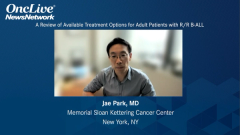
A Review of Available Treatment Options for Adult Patients with R/R B-ALL
Jae Park, MD, shares an overview of available therapeutic options for patients with R/R B-ALL.
Episodes in this series
A Review of Available Treatment Options for Adult Patients With R/R B-ALL
Jae Park, MD: Hi, everyone. My name is Jae Park. I'm one of the leukemia, and B-cell therapist at Memorial Sloan Kettering Cancer Centre taking care of patients, adult patients with ALL and also a research interest in cellular immunotherapy.
So, there are many treatment options fortunately, for our adult patients with Relapsed and Refractory B-Cell ALL. The relapse disease does come in many different forms, meaning they can relapse after their initial chemotherapy or in the middle of their chemotherapy, or they can relapse after their first allogeneic stem cell transplant as well too. And they can also relapse with the disease in the bone marrow, and with and without extra-medullary disease as well. So there are many different flavors for the different type of presentations for the relapse disease. But right now, we do have largely several treatment options, some are immunotherapy. The one is Blinatumomab, which is a Bispecific T-cell engager targeting CD19 and CD3, which is approved for both MRD relapse as well as morphologic relapse, which is defined as greater than 5% for mere blast. We have a second agent Inotuzumab, that's another immunotherapy that's targeting CD22 with the chemotherapy coalition maizing conjugated to it. So it allows elective delivery of chemotherapy to CD22 causative B cells, and then we have CD19 targeted CAR T-cells, we have two product. One is Tisagenlecleucel from Novartis, which is for patients up to the age of 25, and those 18 and older and older adult patients then we do have Brexucabtagene from Gilead as well. That's recently approved in November of last year, in 2021. So chemotherapy, Forth Asian could be an option, but there have been several large randomized trials that have shown that Blinatumomab and Inotuzumab have been superior to chemotherapy, so we rarely use chemotherapy in the cases of Relapse Refractory B-Cell ALL, and only time I probably consider them, will be in late relapse patients. Meaning, the patients will have relapsed disease after at least two years and out, from their initial chemotherapy.
Because we have so many options actually, for Relapsed Refractory B-Cell ALL, and then choosing between any one of them is somewhat of a difficult choice and that, there are many factors that we have to consider. Unfortunately, there are no randomized trials comparing these novel agents Blina, Inotuzumab, and CAR T-cells against each other. So we don't have any data to - prospective data to suggest that one is better than the other. We do have, as I mentioned previously, to have a randomized trial, favoring Blinatumomab and Inotuzumab over chemotherapy. So choosing between these three novel agents again, with a Blina I know and CAR T-cells, again several factors. The patients age and - in their fitness to see whether they can tolerate the particular side effect profiles of these agents, whether they had a pre-existing liver disease, that then may make me less favorable to choosing Inotuzumab and more for Blinatumomab, or CAR T-cells. If the patients had a prior stem cell transplant and not looking to go for a second transplant, we're not a good fit to go to second transplant. I think CAR T-cells in that case is probably the best option. Because Blina and Inotuzumab, as good as they are in inducing initial high response rates, the durability of the remission is somewhat limited, and those are usually considered to be as a bridge to transplant. In CAR T-cell therapy, while we don't know exactly the long-term data yet, as we get more and more in adult, the patients, which we'll go a little bit deeper into, some of them could be bridged into therapy. But the durability of remission for those who are able to receive and tolerate it, seems to be better. So, for those patients who had a prior transplant, I think these are the typical - the CAR T-cells are the agents that I try to reach out - reach out for. And for patients with very low disease burden or MRD, I think Blinatumomab is a very much of a variable choice there. It's specifically approved in that case, with a very good track record and the safety data in this setting.
Transcript Edited for Clarity





































